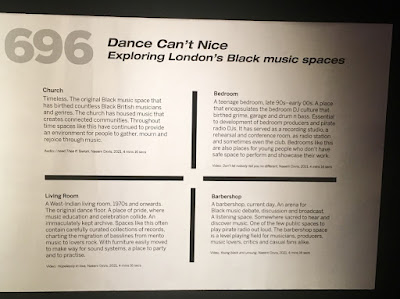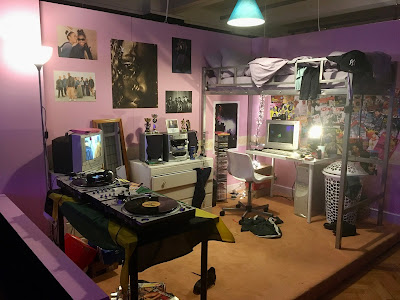Thanks to
Uncarved for pointing me in the direction of this
South London Press story (1 February 2010):
'Strict new operating conditions have been imposed on a popular nightclub that was forced to shut when police learnt a doorman had been targeted for a gangland hit. The Mass nightclub in Brixton had 36 new operating conditions added to its premises licence by councillors after cops called for it to be reviewed. Lambeth’s licensing subcommittee heard the club was closed on December 26 at the request of police. They had received intelligence a doorman was to be shot in retaliation for a brawl in which he was alleged to have been involved at a club in Farringdon, north London. Sgt Steve Strange said police took the decision to serve a 28-day closure order on Mass the next day because a verbal agreement with the club not to use “a certain security firm” had been broken at a time when tensions between rival gangs were high. He said: “We know there are disputes between gangs, and gangs have affiliations to certain promoters and venues. “We are taking steps to keep warring – and I don’t use the word lightly – factions apart. This has been a problematic club and the main reason is the type of music that is played... ‘bashment’. We know it attracts gang members.” The club appealed against the closure order in court and a judge agreed it could open for three pre-planned events over the busy festive period, including the annual Torture Garden fetish club New Year’s Eve Ball. Stan Chicksand, owner of Mass, told the committee the club had already agreed with the police not to stage further bashment – a type of reggae dancehall music – or funky house nights...'What is clear from this report is that the police in London are still 'profiling' events based on the kind of music they play, with funky now very much in the firing line alongside
bashment and grime.
This is despite the fact that following outcry over the Metropolitan police's Form 696 - which they ask venues to fill in with details of club night - it has been amended to take out the question about what kind of music would be played (a question about the ethnicity of the crowd has also been removed).
The Form does still ask for details of the promoter and
DJs, presumably the police have now decided that with this information they can infer the music and crowd for themselves.
Interestingly the focus on funky,
bashment and grime doesn't exactly square with the Police's own report on Form 696 presented to the
Metropolitan Police Authority's Communities, Equalities and People Committee in September 2009.
The report notes that:
'For the period June and July 2009, 166 crime reports were confirmed as relevant to this report, as being linked to a nightclub or a public house. The 166 reports consisted of 1 Murder, 1 Attempted Murder, 151 GBHs, 3 Threats to Kill, 6 Firearms related offences and 4 Affray or Violent Disorder. From the confirmed sample of 166 crimes, 85 were linked to a venue with a music event at the time...All events were found to include a variety of music types. For example “Funk, House music, Indie, Pop” is given as a description of the music played on the night. The music types have been broken down by the number of times they appear in the sample:
48 events are described as including RnB.
32 events included House music.
31 events are described as including Commercial or Pop music.
26 events are described as including Funky House.
20 events included disco or dance music.
16 included Hip Hop.
10 events included Indie.
8 included Rock.
5 events included Soul.
Other music type combinations included any of the above and Bashment, SOCA, Afro Beat, Hip Hop, Garage, Jungle, Cheesy Classics, Clubs Classics, Funk, Electro, Old Skool, Drum & Bass, African Reggae, Lovers Rock, Bhangra, Grime, Dubstep, Arabic, Irish, Latin, Salsa, Oldies, Uplifting, Soulful, and Reggae.
From this the report somehow concludes that 'the likely profile of music events where a serious violent or weapon related crime has occurred' would include the music type being '
RandB, House, Funky House and similar'. But in the list above, commercial pop was ahead of funky, and grime and
bashment barely feature. Can't recall a cop saying that the problem with a club was that is played chart music, despite by definition it being popular with a lot of people, some of whom must be criminals. Why don't they just come out with it and say that that the music they are targeting is the kind that it is likely to attract large number of young black people? Although the profile of victims and suspects also doesn't support this focus:
'Victim Ethnicity:
White European – 66
Dark European – 5
Black Afro/Caribbean – 39
Asian - 8
Oriental - 2
Arabic – 1 eachSuspect Ethnicity:
White European – 62
Dark European – 12
Black Afro/Caribbean – 54
Asian - 5'.As
discussed here previously, violence around clubs in London is a real phenomenon, but shooting and stabbing people is already against the law. The current position amounts not only to blanket discrimination against particular types of music, but to the deliberate prevention of whole parts of the community socialising on their own terms to their soundtrack of choice. The intent might not be racist, but the effect is. A similar '
preventative approach' is not taken in other contexts - how often is a football match cancelled because it might attract violence, even when everybody knows in advance that it's going to kick off.
Policies like this do actually impact on the evolution of music itself. Since a lot of dance music is produced specifically for clubs, the drying up of opportunities to play out particular sounds leads to people switching their energies elsewhere. It is certainly arguable that the reduction in grime nights in London at police instigation has led to a stalling of the genre, with funky filling the gap. Some grime DJs switched to funky when they couldn't get gigs - now funky too is coming in for attention.






